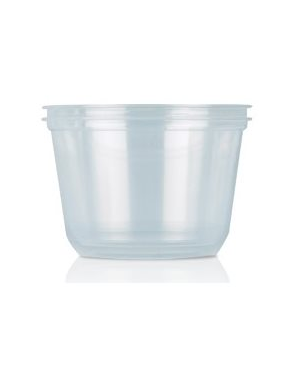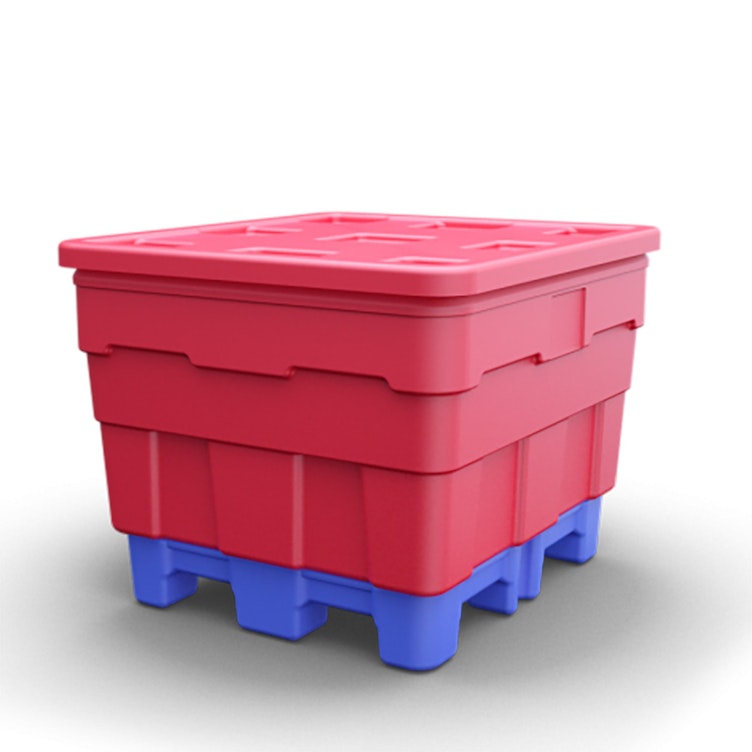A Comprehensive Guide to the Various Sorts Of Mass Plastic Containers Available Today
Mass plastic containers play an important duty in various markets, supplying solutions for storage and transportation. Their diverse kinds cater to different requirements, from stiff alternatives for strong products to flexible containers suiting various forms. Each type presents distinctive benefits, making it necessary to recognize their applications and attributes. As sectors advance, so do the demands for reliable container services. What factors should one take into consideration when picking the right mass container?
Summary of Bulk Plastic Containers

Kinds Of Bulk Plastic Containers
Bulk plastic containers been available in various forms, each matched to details applications. Inflexible bulk containers, adaptable bulk containers, and intermediate mass containers represent the main categories, each offering one-of-a-kind advantages. Understanding these types is important for picking the appropriate container for delivering and keeping products.

Stiff Mass Containers
Stiff bulk containers are crucial for effective storage and transport of various products across sectors. These containers are usually created from sturdy plastics, enabling them to withstand rough handling and environmental conditions. They can be found in numerous sizes and shapes, consisting of bins, totes, and drums, making them ideal for storing every little thing from granular compounds to liquids. Inflexible containers commonly include reinforced wall surfaces and safe lids, making sure the contents stay protected throughout transportation. Their stackable style optimizes storage room, making them suitable for storage facilities and manufacturing facilities. In addition, numerous rigid bulk containers are multiple-use and recyclable, adding to sustainability initiatives. Generally, their effectiveness and adaptability make stiff mass containers a crucial part in supply chain operations.
Adaptable Mass Containers
Versatile bulk containers, usually described as versatile intermediate bulk containers (FIBCs), offer as a functional remedy for storing a range and carrying of dry materials. These containers are usually made from woven polypropylene and are created to be light-weight yet solid, permitting effective handling and piling. Their adaptability allows them to fit various shapes and dimensions, making them ideal for products varying from grains to chemicals. FIBCs can be equipped with features such as spouts for simple dental filling and discharge, in addition to protective coverings for enhanced durability. Furthermore, they are recyclable and recyclable, adding to lasting practices in sectors such as farming, food handling, and building. Overall, adaptable bulk containers offer a efficient and affordable alternative for bulk material management.
Intermediate Mass Containers
Intermediate bulk containers (IBCs) are vital for the reliable transportation and storage space of fluids and granular products throughout various markets. These containers generally have a capability varying from 275 to 330 gallons and are developed for simple handling and stacking. Made from durable products like high-density polyethylene or steel, IBCs offer exceptional protection versus contamination and ecological aspects. Their style consists of features such as an integrated pallet for forklift accessibility and a removable top for easy dental filling and cleansing. IBCs are extensively used in chemical, food, and pharmaceutical markets, guaranteeing conformity with safety guidelines. Their versatility and reusability make them an affordable solution for bulk storage space and transport, adding to provide chain performance and sustainability.
Features and Advantages of Bulk Plastic Containers
Mass plastic containers are essential tools in various sectors, providing a mix of resilience and practicality. These containers are created from high-quality products, making them immune to influences, chemicals, and ecological variables. This toughness assurances product safety and security during storage space and transport.
Furthermore, mass plastic containers are lightweight, helping with convenience of managing and lowering delivery prices. Their stackable design makes best use of storage performance, permitting enhanced stockroom room. Several versions include protected covers or closures, providing an impermeable seal that protects components and avoids contamination.
Mass plastic containers are recyclable and typically reusable, contributing to sustainable techniques. Their adaptability allows for a large range of applications, from food storage space to industrial use, boosting their value across industries. Businesses gain from the long life expectancy and reduced upkeep demands of these containers, making them an affordable option for both temporary and long-lasting demands.
Industries That Use Bulk Plastic Containers
Numerous markets take advantage of making use of mass plastic containers, each leveraging their one-of-a-kind buildings for specific applications. The food and drink industry depends on these containers for risk-free storage space and transportation of products, while the chemical manufacturing industry utilizes them for managing hazardous products. Additionally, the pharmaceutical distribution needs stress the importance of toughness and tidiness in packaging remedies.
Food and Drink Market
As the demand for reliable and secure storage space services proceeds to rise, the food and beverage sector significantly counts on mass plastic containers for their functional needs. These containers supply robust, lightweight, and functional alternatives for keeping active ingredients, completed items, and waste materials. Made from food-grade materials, they assure compliance with health and wellness criteria. Different styles, such as stackable bins and carry boxes, enhance space throughout transportation and storage, boosting logistical efficiency. In addition, the transparency of some bulk containers enables easy supply monitoring, reducing the threat of perishing. With the industry's focus on sustainability, several makers are now using recyclable and recyclable options, straightening with green practices while fulfilling the high needs of food safety and security and health.
Chemical Production Sector
The chemical production field counts greatly on mass plastic containers for the secure and reliable storage of basic materials, intermediates, and completed products. These containers are made to hold up against various chemicals, guaranteeing that dangerous products do not leak or degrade the container itself. Typical types consist of high-density polyethylene (HDPE) and polypropylene containers, which provide outstanding chemical resistance and durability. Their lightweight nature and stackable layout facilitate transportation and storage space, optimizing room in manufacturing facilities. Additionally, numerous mass plastic containers include functions such as tamper-evident seals and easy-to-read labeling, improving security and compliance with market guidelines. Overall, bulk plastic containers are integral to the chemical manufacturing procedure, offering dependable remedies for managing varied compounds.
Pharmaceutical Circulation Demands
Pharmaceutical circulation relies on mass plastic containers to satisfy strict safety and security and governing needs. These containers are vital for transporting and storing a range of pharmaceutical products, including active pharmaceutical components (APIs) and completed drugs. Their style assurances protection versus moisture, contamination, and light, maintaining the integrity of sensitive materials. Furthermore, bulk plastic containers are compliant with industry requirements such as Great Production Practices (GMP) and are usually made from products that are FDA-approved. The use of these containers improves my website performance in the supply chain, enabling safe, large-scale circulation while minimizing waste. Firms in the pharmaceutical field prioritize using long lasting, leak-proof, and tamper-evident containers to assure product safety and top quality throughout the logistics process.
Factors to consider for Picking the Right Container
When choosing the suitable bulk plastic container, different elements need to be carefully considered to assure excellent capability and security. The nature of the materials to be saved is extremely important; compatibility with the container's material can affect integrity and safety. plastic bulk containers. Additionally, the container's shapes and size must line up with the storage and transportation requirements, assuring reliable space application
Lots capability is an additional crucial consideration, as it needs to accommodate the weight of materials without threat of damage or failure. The layout functions, such as venting or covers, can affect use and gain access to. Conformity with market laws is vital, particularly in markets like pharmaceuticals, where safety requirements are rigid.
The expected life expectancy and toughness of the container must be examined to verify it satisfies the functional needs without frequent substitute. By assessing these variables, one can pick one of the most appropriate mass plastic container for specific applications.
Ecological Effect and Sustainability
As services increasingly prioritize sustainability, the ecological influence of bulk plastic containers has come under analysis. These containers, often made from materials such as polyethylene or polypropylene, add substantially to plastic waste if not managed correctly. Their manufacturing entails the intake of nonrenewable fuel sources, which can result in enhanced greenhouse gas exhausts. Nevertheless, advancements in reusing modern technology and the growth of naturally degradable options are helping to alleviate these worries.
Moreover, lots of suppliers are taking on techniques that emphasize the usage of recycled products, thereby reducing the need for virgin plastics. The resilience of bulk plastic containers also plays a function; they are developed to be reused numerous times, which can reduce their overall environmental impact when compared to single-use alternatives. Inevitably, the sector faces the difficulty of balancing functionality with environmental duty, making sustainable practices essential for the future of bulk plastic containers.
Best Practices for Storage and Transportation
Effective storage and transportation of bulk plastic containers significantly affect both functional efficiency and sustainability. To make best use of space, companies must stack containers securely, assuring stability and avoiding damage. Proper labeling is vital for simple recognition, which simplifies access processes. In addition, preserving a orderly and clean storage space location decreases the threat of contamination and enhances security.
For transportation, selecting the right car is essential; containers must be secured to avoid moving during transit. Companies must also think about utilizing pallets to assist in simpler loading and discharging. Regular evaluations of containers for deterioration can avoid costly replacements.
Temperature level control is one more important element, as extreme conditions can endanger the stability of the plastic. Training workers on finest methods for managing and transportation assurances conformity and promotes a culture of security. By applying these best practices, businesses can enhance their operational performance while adding to environmental sustainability.
Regularly Asked Concerns
Exactly how Do I Tidy Mass Plastic Containers Efficiently?
To tidy bulk plastic containers effectively, one must rinse them with warm water, use a mild cleaning agent and scrub with a soft brush. Wash extensively, then allow to air completely dry totally prior to storage space or reuse.
What Is the Lifespan of Mass Plastic Containers?
The life-span of mass plastic containers normally varies from 5 to ten years, depending upon the material, use, and ecological conditions. Correct maintenance and storage space Resources can greatly expand their functionality and resilience over time.
Can Mass Plastic Containers Be Custom-made?

Do Mass Plastic Containers Have Service Warranty Options?

Exist Regulations for Making Use Of Mass Plastic Containers?
Yes, policies exist for utilizing mass plastic containers, mostly concentrated on safety, ecological impact, and material compliance. These laws assure that containers satisfy industry criteria and appropriate for moving different compounds safely and efficiently.
Stiff bulk containers, flexible bulk containers, and intermediate mass containers stand for the key groups, each offering distinct benefits. Versatile bulk containers, commonly referred to as flexible intermediate bulk site link containers (FIBCs), offer as a versatile option for storing a selection and carrying of completely dry materials. The chemical production industry depends greatly on mass plastic containers for the secure and efficient storage space of raw materials, intermediates, and ended up items. bulk plastic containers for sale. These containers are created to stand up to various chemicals, ensuring that hazardous products do not leak or break down the container itself. In addition, mass plastic containers are compliant with market requirements such as Great Manufacturing Practices (GMP) and are typically made from products that are FDA-approved